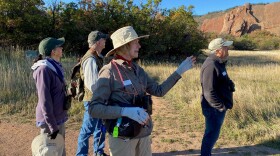-
Many birds are in trouble nationwide. A 2019 study published by Cornell found that bird populations have declined 30% since 1970. That's nearly three billion birds.
-
White-nose syndrome is a fungus that develops in the cave-dwellers during winter hibernation. It invades their skin and can be deadly. According to the Fish and Wildlife Service, it’s caused estimated population declines of more than 90% in affected colonies.
-
The U.S. Fish and Wildlife Service is proposing a regulation change under the Endangered Species Act that would allow some species to be introduced outside their historical ranges. With more flexibility some endangered and threatened species could be moved to other suitable habitats.
-
As grizzlies move beyond the boundaries of the Northern Continental Divide Ecosystem and create conflict, Montana seeks full management authority.
-
Today on Colorado Edition, we learn why one species of fish native to the Colorado River is no longer on the endangered list. We also learn about a new set of policy recommendations aimed at protecting Colorado’ big game populations, and hear why many Western cities are recording some of the worst air quality levels on the planet.
-
The humpback chub, a rare fish found only in the Colorado River basin, has been brought back from the brink of extinction after decades of protection, though work must continue to ensure its survival, federal authorities said Monday in reclassifying the species from endangered to threatened status.
-
We’ve heard a lot about wolf reintroduction in our region, but that’s not the only carnivore environmentalists want to bring back.
-
Wildlife and Indigenous communities have long relied on Quitobaquito Spring for freshwater in the middle of the Sonoran Desert.
-
Ten artists from Mexico, Central America and the Caribbean recorded tracks using birdsong from their country, with all profits of the vinyl and digital release going to bird conservation projects.
-
Federal lands are much better at reducing habitat loss and protecting endangered species than private lands, according to a new study out this week by...

Play Live Radio
Next Up:
0:00
0:00
Available On Air Stations










